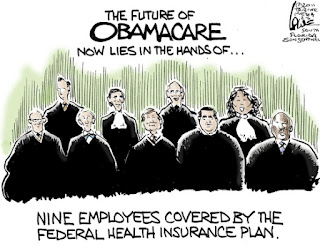Markets and the Public Good:
Private and Public Leadership
Some argue that we should just let the market alone work things out and government intervention is always a problem. While we do need to regulate wisely, to protect the public good, which includes protecting the free market, the extreme ‘markets alone’ position is inconsistent with our long history of public-private collaboration for prosperity, from the moon launch to the super highway system.
Some argue that we should just let the market alone work things out and government intervention is always a problem. While we do need to regulate wisely, to protect the public good, which includes protecting the free market, the extreme ‘markets alone’ position is inconsistent with our long history of public-private collaboration for prosperity, from the moon launch to the super highway system.
In
our current debates over financial and health care regulation it would be
prudent to recognize that in both arenas we need responsible public and private
leadership, and in times like today it would be best if they were working in
concert.
Economist
Paul Krugman is not interested in excusing the leadership failures in the
private sector that caused the great recession, and continue to delay our
recovery. But he is equally uninterested
in ignoring the leadership failures in the public sector making the situation worse
still. This is a great column, well
worth the two minutes it will take to read it.
After criticizing German leadership failures Krugman turns to the Fed.
“Yet let’s not ridicule the
Europeans, since many of our own policymakers are acting just as irresponsibly.
And I’m not just talking about congressional Republicans, who often seem as if
they are deliberately trying to sabotage the economy.
Let’s talk instead about the
Federal Reserve….Why won’t the Fed act? My guess is that it’s intimidated by
those congressional Republicans, that it’s afraid to do anything that might be
seen as providing political aid to Obama, that is, anything that might help the
economy. Maybe there’s some other explanation, but the fact is, the Fed, like
the European Central Bank, like the U.S. Congress, like the government of
Germany, has decided that avoiding economic disaster is somebody else’s
responsibility.
None of this should be happening.
As in 1931, Western nations have the resources they need to avoid catastrophe,
and indeed to restore prosperity — and we have the added advantage of knowing
much more than our great-grandparents did about how depressions happen and how
to end them. But knowledge and resources do no good if those who possess them
refuse to use them. And that’s what
seems to be happening.”
Financial to Health Care MarketsIt seems clear that President Reagan could not be elected in today’s Republican party. Farah Stockman reminds us that President Nixon’s support for a national health care system (like President Obama’s in that it also sought to strengthen our current system of privately provided insurance) would similarly exile him from the Republican party today…for supporting universal coverage and for doing so by seeking an alliance with Ted Kennedy.
“Ted Kennedy, whom Nixon
assumed would be his rival in the next election, made universal health care his
signature issue…. Nixon proposed a plan
that required employers to buy private health insurance for their employees and
gave subsidies to those who could not afford insurance. Nixon argued that this
market-based approach would build on the strengths of the private system.
“Government has a great role to play,” he said, “but we must always make sure
that our doctors will be working for their patients and not for the federal
government.”
No one breathed a word at the
time about Nixon’s plan being unconstitutional.
When Obama ran for office,
his aides contacted Altman, a key architect of the Nixon plan, and asked him to
serve as an adviser…. Although the two
plans are different — Nixon’s mandated companies to buy insurance, while
Obama’s mandates individuals — both bolster the system of private insurance instead
of creating something new.
“Every once in awhile Obama
would say, ‘Wouldn’t single-payer be simpler?’ ”’ Altman recalled. “The answer is yes. But
America wasn’t ready for it.” When Congress finally passed the bill, Altman
knew that it would take years to perfect it. But he felt extremely proud. He
never imagined that the Supreme Court could throw a wrench in it. That would
never have happened in the 1970s.”


No comments:
Post a Comment